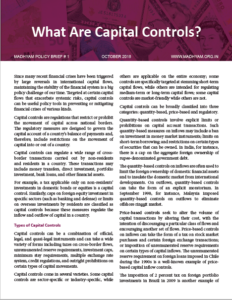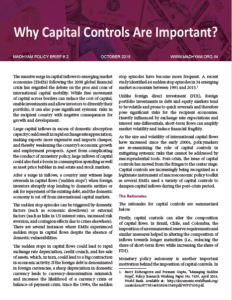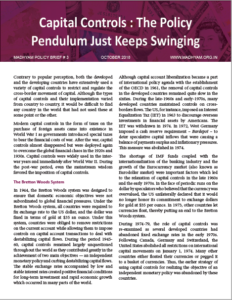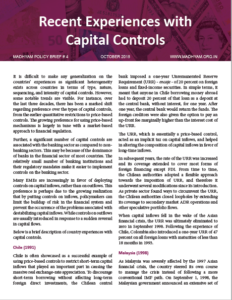
CSOs are calling for better managing cross-border volatile capital flows
Many countries with so-called emerging market economies have recently experienced the pros and cons of the free movement of capital. After the 2008 global financial crisis, these countries saw a huge inflow of capital. While investment was welcome in order to boost the economy and government budgets, it also resulted in a rapid exchange rate appreciation, increased government and corporate debt, and asset price bubbles. In addition, the central banks needed to hold large and expensive foreign currency reserves to be able to withstand sudden money withdrawals.
In 2018, decisions in the US to stop to ‘printing money’ (‘quantitative easing‘), and increase US interest rates made investors and banks quickly withdraw money from emerging market countries. This resulted in a quick currency depreciation in these countries, making it much more difficult to repay their high governmental and corporate debt in foreign currency, abruptly stopping access to foreign funding by domestic entities and a fire sale of assets. This had a negative impact on the economy and development.
These negative consequences of the free inflows and outflows of money have reignited the debate on whether the mobility of international capital needs to be restricted. There are different ways to impose so-called capital controls, or capital flow management measures, but the IMF, the OECD and the international financial markets are not in favour of such capital controls while the EU prohibits such capital movement restrictions in its constitution and its free trade and investment agreements. In contrast, recently policy makers in emerging markets have emphasised the importance of capital controls in pre-empting financial crises, and as an essential component to safeguard financial and macroeconomic stability.
In order to raise awareness and stimulate the debate, Kavaljit Singh, Director of the Indian NGO Madhyam, in cooperation with other civil society organisations like SOMO, has issued four short policy briefings that explain what capital controls are and how they can be useful policy tools to protect countries against the vulnerability of free capital movements.
Comments, suggestions and feedback on those briefings are welcome and can be emailed to kavaljit.singh[@]gmail.com and mvanderstichele[@]somo.nl.
Do you need more information?
-

Myriam Vander Stichele
Senior Researcher
Partners
Related news
-
 CSDDD Datahub reveals law covers fewer than 3,400 EU-based corporate groupsPosted in category:News
CSDDD Datahub reveals law covers fewer than 3,400 EU-based corporate groupsPosted in category:News David Ollivier de LethPublished on:
David Ollivier de LethPublished on: -
 Additional evidence filed against Booking.com for profiting from illegal settlementsPosted in category:News
Additional evidence filed against Booking.com for profiting from illegal settlementsPosted in category:News Lydia de LeeuwPublished on:
Lydia de LeeuwPublished on: -
 The hidden human costs linked to global supply chains in ChinaPosted in category:News
The hidden human costs linked to global supply chains in ChinaPosted in category:News Joshua RosenzweigPublished on:
Joshua RosenzweigPublished on:






